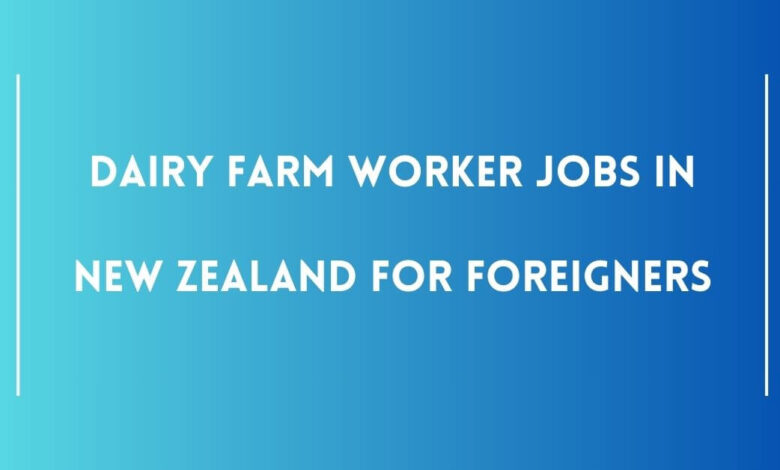Dairy Farm Worker Jobs in New Zealand For Foreigners 2024

Daily worker positions are the most coveted and in-demand occupation in New Zealand, attracting both unskilled local and foreign laborers. Many international dairy farm workers are interested in relocating to New Zealand to work as dairy farm workers, but they are uncertain about the application procedure, where to look, what qualifications are required, and so forth.
This document contains all the pertinent details regarding Dairy Farm Worker Jobs in New Zealand, in addition to hyperlinks to the application websites.
Check Also: Crop Grader Jobs in New Zealand Visa Sponsorship
Details of Dairy Farm Worker Jobs in New Zealand For Foreigners
- Job title: Dairy Farm Workers
- Country: New Zealand
- Prior Knowledge and Experience required
- Visa Sponsorship available
Available Dairy Farm Worker Jobs in New Zealand
- Cleaners and sanitary workers
- Animal health inspector
- Cheese packaging staff
- Home delivery drivers
- Production Supervisor
- Cattle grazers
- Shearer
- Wool handler
- Wool Presser
- Dairy Farm Assistant
- Arable Operator
- Pivot Assembly Foreman
- Cattle Hoof Trimmer
- Shepherd General
- Large Animal Reproductive Technicians
- Dairy Farm Supervisor
- Dairy Farm manager
- Milk Harvestor
- Chicken Catchers
- Genetic technician
- Tractor Driver
- Farm Labourer
- Trainee Meat inspectors
- Dairy Support Manager
- Sheep & Beef farm Worker
- Farm Hand
Benefits of Dairy Farm Worker Jobs
- Welfare and Care for Animals: Personnel employed in dairy farms bear the responsibility of ensuring the welfare and care of dairy animals, such as cows. This engagement in animal husbandry fosters a sense of responsibility and compassion by facilitating a connection with and comprehension of the needs of animals.
- Milk Manufacturing: The labor of dairy farm employees is crucial to the manufacturing of milk. Their responsibilities include the supervision of animal health, milking cows, and maintaining the purity of the milk produced.
- Contribution to the Supply of Food: Dairy farm employment enhances the food supply through the production of vital dairy products and milk, which are integral constituents of a well-balanced diet. This effort assists in satisfying the market’s need for nourishing and pure dairy products.
- The Diversity of Jobs: A dairy farm entails a diverse range of responsibilities, including animal care and feeding, facility maintenance, mechanical operation, and day-to-day operations management. This diversity provides employees with the opportunity to develop a wide array of skills.
- The Environmental Implications: The proximity of numerous dairy farms to the environment and to rural areas fosters a sense of connection with the natural world. Employees might value the chance to work in public areas and take part in sustainable agricultural practices.
- Collaboration in Teams: Dairy farming frequently necessitates the cooperation and coordination of agricultural laborers. As individuals collaborate to accomplish shared objectives, this promotes a feeling of camaraderie and cooperation.
- Skill Enhancement: Employment in the dairy industry offers prospects for the enhancement of competencies in fields including farm management, equipment operation, and animal husbandry. This practical experience may prove beneficial for both individual and professional development.
- Consistent Employment: The dairy sector is an indispensable and dependable component of the agricultural industry. The presence of dairy product demand ensures a continuous requirement for labor on dairy farms, thereby contributing to a degree of employment stability.
- Relationship with Regional Communities: Frequent dairy farms have strong connections to the surrounding communities. Active participation in dairy farm labor enables individuals to make a societal and economic impact while frequently fostering engagement with neighbors and members of the community.
- Health Advantages: Physical exertion is required for employment on a dairy farm, where duties include operating machinery, cleaning stables, and feeding animals. This may positively impact one’s overall health and fitness.
- Possibilities for Progress: There may be prospects for individuals beginning their careers in entry-level positions on a dairy farm to progress towards more senior positions, including farm management or specialized roles within the dairy industry.
Requirements of Dairy Farm Worker Jobs
Foreign nationals who wish to work on dairy farms are required to possess a qualified worker visa. You’ve made progress, however, if your employer covers the cost of your sponsorship. Additionally, it is vital to bear in mind that although possessing suitable credentials does not ensure employment, they will substantially bolster your application.
For instance, a degree in dairy farming and entrepreneurship, an online dairy technology course, a short course on dairy production and administration, or any other credentials pertaining to agriculture. Moreover, you require:
- A year of experience is required as a minimum; however, positions without experience are frequently advertised.
- knowledge of every dairy technology and agricultural technique.
- The physical condition.
Average Salary of Dairy Farm Worker Jobs in New Zealand
It is contingent on the qualifications, background, location, and so forth of the applicant. Nevertheless, Glassdoor reports that the average salary of a dairy farm worker in New Zealand is $15,000.
Frequently Asked Questions:
-
How much is the salary for a dairy farm worker in New Zealand?
The average pay for a Laborer on a Dairy Farm is NZD 43,064 a year and NZD 21 an hour in New Zealand. The average salary range for a Laborer Dairy Farm is between NZD 32,987 and NZD 49,868.
-
Why is New Zealand famous for dairy?
New Zealand’s grass-fed cows produce some of the world’s best-quality milk. The quality of the milk cows produce is directly related to their diet and environment. So it’s no wonder that New Zealand’s pasture-fed cows, feasting on our lush green grass, produce some of the best milk in the world.
-
How do I become a farmer in New Zealand?
There are no specific requirements to become a farmer or farm manager. However, employers often prefer that you qualify such as a New Zealand Certificate in Agriculture. Diploma in agriculture.





